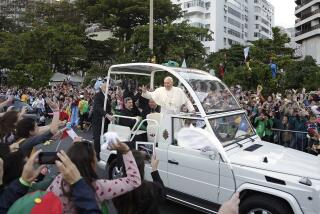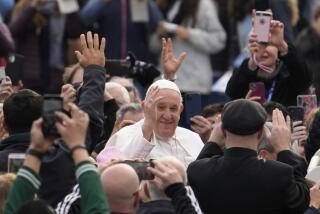Pope’s Visit Left Cuba Changed, Mahony Says
- Share via
Cardinal Roger M. Mahony returned Monday from Cuba and declared that it is “almost unthinkable” that religious freedom will again be suppressed after Pope John Paul II’s historic visit and that the church, not the Communist revolution, ultimately will prevail there.
“Yesterday there was a new kind of revolution, a spiritual, pastoral revolution that was as important--maybe far more important--than the 39 years preceding it,” said Mahony, referring to the Mass the pontiff celebrated at the close of his four-day visit to Cuba.
Mahony, the Roman Catholic archbishop of Los Angeles, joined the pope at Sunday’s Mass in Havana’s Plaza of the Revolution, so named to commemorate Castro’s victory 39 years ago. He told reporters upon his return that he was struck by the outpouring of enthusiasm and expressions of faith by 500,000 Cubans of all ages who filled the plaza for the Mass.
“I was expecting to see a much older population at this Mass. I had come to presume that it was the older Cuban population that would remember their church, their faith, and the pope and would make a special effort to be there,” Mahony said.
“But in fact the vast majority of people who were there were families, young children and youth.”
Mahony added that as he studied the faces of John Paul and Castro, both in their 70s, he wondered about Cuba’s future. “I couldn’t help but think . . . whose legacy will live longer on this island.”
“It certainly seemed to me that the man with the 2,000-year legacy is going to prevail on that island. Not the man with the 39-year legacy.”
Castro sat in the front row of the crowd, making the Mass reportedly the first attended by a Cuban president since Castro overthrew the Fulgencio Batista regime in 1959, Mahony said.
Still, Mahony said, tests lie ahead. One of Castro’s first tests, as Mahony called them, would be his response to the pope’s plea for the release of 500 political prisoners.
Other benchmarks, he said, will be whether the government allows the church to reopen parochial schools and import religious books and other materials, whether officials return church buildings and other property confiscated in 1961, and whether the government grants the church access to the state-controlled media, as happened during the papal visit.
At the same time, Mahony said, Castro has found in the pope an ally in his campaign to lift the U.S. economic embargo of Cuba.
“Castro could not have been more pleased with the pope’s calling of an end to the economic embargo for Cuba,” Mahony said. Mahony also said he hoped the church would be able to step up its delivery of medicine and medical equipment under the auspices of Catholic Charities.
Mahony said that backsliding by the Castro government was unlikely, in part because the international spotlight continues to shine on Cuba and any effort to return to the earlier status would further isolate the country, an isolation Castro appears determined to overcome.
“The spiritual and pastoral revolutions that began this past week in Cuba cannot be turned around on Monday morning,” Mahony said.
Mahony said he was impressed by the crowd’s “joy and gusto” during the papal Mass. He said Cubans were particularly moved by the pope’s frequent use of the word “freedom.”
“In his closing homily almost every paragraph had the word ‘libertad,’ or ‘freedom,’ in it,” Mahony said. “He was interrupted 28 times with applause and he even bantered with the people and said to them, ‘It is good for you to interrupt the pope so that I can get a little rest while giving this talk.’ He was in just a wonderful mood,” Mahony said.
As for John Paul’s health, Mahony said that although the pope walked slowly, he looked well and seemed energized by the people. “You can tell he just loves being there in these circumstances with these people, just loves it,” Mahony said.
More to Read
Sign up for Essential California
The most important California stories and recommendations in your inbox every morning.
You may occasionally receive promotional content from the Los Angeles Times.










